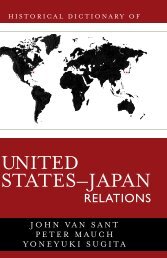Private Academies of Chinese Learning in Meiji Japan: The Decline ...
Private Academies of Chinese Learning in Meiji Japan: The Decline ...
Private Academies of Chinese Learning in Meiji Japan: The Decline ...
You also want an ePaper? Increase the reach of your titles
YUMPU automatically turns print PDFs into web optimized ePapers that Google loves.
198 PRIVATE ACADEMIES OF CHINESE LEARNING IN MEIJI JAPANwas little conception <strong>of</strong> formal education be<strong>in</strong>g important forsuccess, especially if the family was wealthy. Farmers’ sons whodid go to school beyond elementary level were commonlyyounger sons from families who could afford to send them awayor who had impressed their teachers by their exceptional ability.Merchant families usually preferred their children to becomeapprentices after receiv<strong>in</strong>g elementary education. 75 Women’sschool<strong>in</strong>g beyond elementary school was not seen as importantat all.<strong>The</strong> number <strong>of</strong> pr<strong>of</strong>essions for which school<strong>in</strong>g was anecessary condition was at first limited to posts <strong>in</strong> government,the law, medic<strong>in</strong>e and teach<strong>in</strong>g. <strong>The</strong>se required pass<strong>in</strong>gexam<strong>in</strong>ations but not neces sarily attend<strong>in</strong>g certa<strong>in</strong> schools. 76One decisive step, however, did make attend<strong>in</strong>g the prescribedschools the only way to advancement (gakureki shakai). This wasthe system <strong>of</strong> privileg<strong>in</strong>g graduates <strong>of</strong> certa<strong>in</strong> (usually state)schools by exempt<strong>in</strong>g them from civil service and pr<strong>of</strong>essionalexam<strong>in</strong>ations and allow<strong>in</strong>g them a shorter period <strong>in</strong> the conscriptarmy. From the <strong>in</strong>troduction <strong>of</strong> civil service exam<strong>in</strong>ations <strong>in</strong> 1887until 1893 only graduates <strong>of</strong> Tokyo Imperial University wereexempt. S<strong>in</strong>ce the quota <strong>of</strong> civil servants was usually filled withprivileged graduates, pupils who attended private schools hadlittle chance <strong>of</strong> becom<strong>in</strong>g civil servants. Even after 1893university graduates were exempt from the first part <strong>of</strong> the twopartexam<strong>in</strong>ation. Privileges relat<strong>in</strong>g to the exam<strong>in</strong>ations fordoctors, lawyers, pharmacists and middle school teacherscont<strong>in</strong>ued even after they were abolished for the civil serviceexam<strong>in</strong>ations. Some private schools managed to secure privilegesfor their graduates by meet<strong>in</strong>g certa<strong>in</strong> conditions imposed by thegovernment. But the result <strong>of</strong> this system was that places at stateschools were more desirable and state schools had more prestige.<strong>The</strong>oretically, it was still possible to pass the pr<strong>of</strong>essionalexam<strong>in</strong>ations without formal school<strong>in</strong>g. As late as 1904, 39 percent <strong>of</strong> all middle school teachers had no formal qualifications atall and only half <strong>of</strong> the rest had gone through the school system,the others hav<strong>in</strong>g passed exam<strong>in</strong>ations. 77 Between the late 1890sand the early 1910s the private specialist schools catered for thoseattempt<strong>in</strong>g the self-study route by publish<strong>in</strong>g lecture notes(kōgiroku; there was still a dearth <strong>of</strong> textbooks for the modernsubjects) and <strong>of</strong>fer<strong>in</strong>g distance learn<strong>in</strong>g. 78 But here too optionswere narrow<strong>in</strong>g as competition for the exam<strong>in</strong>ations <strong>in</strong>creased,













